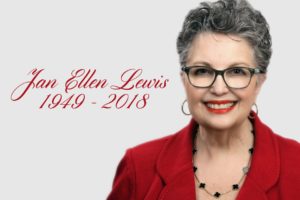Memorials: Jan Lewis by Serena Zabin
Jan Lewis served on the Omohundro Institute Council from 1996 to 1999.

From Serena Zabin
Jan Ellen Lewis died in New York City on August 28, 2018. Others have already celebrated her important contributions to our understanding of early American and Jefferson in particular (please see her New York Times obituary of September 5 as well as the reflection by Peter Onuf and Annette Gordon-Reed for the Society for the History of the Early American Republic). In October, Rutgers University will celebrate Jan’s contributions to the institution, where she spent nearly forty years on the faculty and as Dean of Arts and Sciences.
I would like to try to put into words what it meant to be a student of Jan Lewis. First and foremost, it was and is an extraordinary honor that I will cherish all my life.
Jan had far more students than those whose dissertations she advised. She mentored men and women at many institutions, and her circle of students was always expanding. Somehow, she never seemed to run out of time, or interest, or attention. The most remarkable thing about this wide circle is that, unlike so many other advisors, Jan never made any of us feel that we had to compete for her attention. She responded to our queries and requests and emails immediately, reassuring us that she had time for everyone as an individual.
By the breadth of her personal network and by her explicit affirmation of every member of that network, Jan showed us how friendships and connections build a scholarly life. She wanted her students to support each other, not measure themselves against one another or the rest. Jan never suggested that one student’s path was the only right way from which the rest of us had deviated. Over and over she showed us that there are many paths to success as a scholar, including her own transition from faculty to administration.
In no aspect of her mentoring was this more clear than in the ways that Jan supported our non-academic lives. To have a child, or to balance ambition with other personal ties, was no failure in Jan’s eyes. Quite the opposite: Jan expected her students to be people who lived in the world, difficult as that sometimes is. Her love and respect for her husband Barry and her son James, and in later years, her unending adoration of her two beautiful granddaughters reminded us all how love and work were essential to a happy life. But she never pretended that it would always or ever be easy, and she didn’t leave us to navigate those challenges alone. When I was expecting twins and was too huge to reach the blackboard, she told me that it is a feminist act to stand up in front of a classroom and model how a woman could think and gestate at the same time.
Long after my dissertation was done, Jan continued to mentor me and her other students. She spent as much time helping me revise that dissertation as she did helping me write it. I only really became a professional historian after I left Rutgers, leaning on Jan to guide me through department politics, teaching, and committees. She tried to treat me as an equal member of the guild. But I never stopped looking up to her.
The most delightful part of being Jan’s student was how tirelessly she championed us and our work. She would march into conference rooms waving one of her students’ books over her head for all to see and gushing about its brilliance. Jan was shameless in her fierce commitment to her students. I am sure that others have received notes like the one she once emailed me: “It is my prerogative to hate anyone who doesn’t love your work.” Who knows how regularly she exercised that prerogative, but the sentiment alone was a wonderful balm to a bruised ego.
Finally, Jan was a historian for whom the past and the present always informed each other. We have to live in this world, she would say, in order to understand anything about another one. Most of all, Jan thought that living life fully was essential for her students. She told me long ago that to be a humanist, one needed to experience human emotions, both joy and sorrow, celebration and loss. The more we experience, the better historians we can become. I am not sure how the pain of losing Jan will help us make sense of the past. I am sure, however, that to mourn Jan is to honor her as the unparalleled historian and teacher that she was. Both for historians who had the privilege of knowing her in person and for those who will only know her through her words, Jan’s memory will always be a blessing.
Serena Zabin
